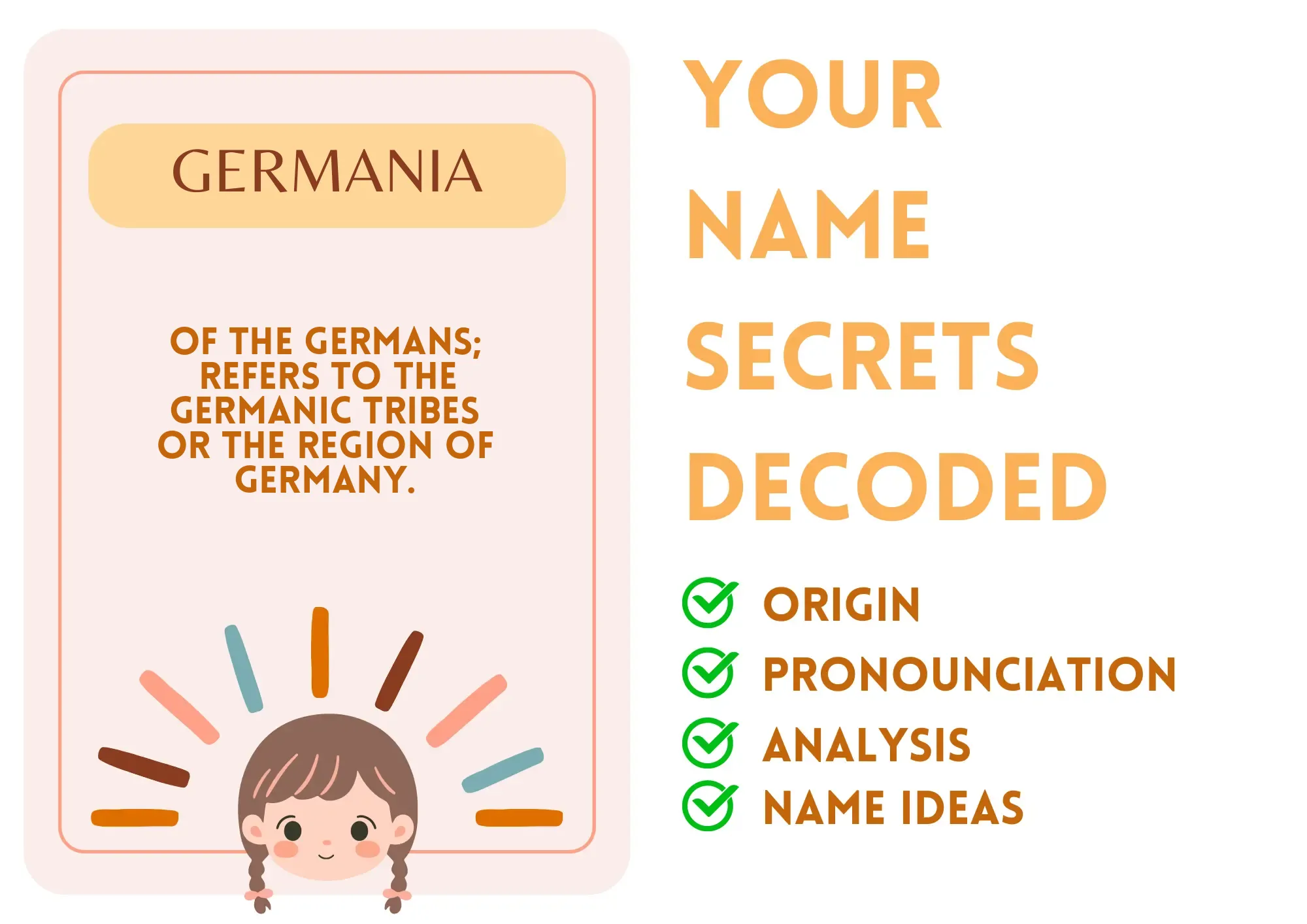
Germania
Germania is an evocative name derived from Latin, historically used to refer to the ancient tribes of Germany. It embodies a sense of strength, history, and cultural identity. While it is primarily feminine, the name can be considered unisex in some contexts. The term Germania originally referred to the geographical region inhabited by the Germanic tribes, making the name deeply linked to a rich cultural and historical significance.
People often perceive Germania as a name that represents heritage and roots. It has a unique charm, evoking feelings of pride and tradition. Though not commonly used as a first name today, Germania has a distinctive quality that sets it apart.
Basic Information
Gender: Girl
Sounds Like: jer-MAN-ee-uh
Pronunciation Explanation: The name emphasizes the second syllable, pronounced like 'MAN', followed by a soft 'ee' sound, and ending with a light 'uh'.
Summary and Meaning
Meaning: Of the Germans; refers to the Germanic tribes or the region of Germany.
Origin: The name Germania comes from Latin origins, referring to the geographical region and the tribes of Germans.
Usage: Primarily a feminine name, though it has the potential to be used in a unisex manner depending on personal preference.
Name Number (Chaldean)
Name Number (Pythagorean)
Popularity (Global Rank)
Overall: 22100
Girls: 58767
Most Popular in
Religious and Cultural Significance
Religion: N/A
Background: As a name, Germania does not have specific ties to any religion, but it carries strong cultural significance related to the history and identity of the German people.
Cultural Significance: In Western culture, Germania symbolizes nationalism and pride in German heritage. It resonates with themes of history and cultural identity.
Historical Significance: Historically, Germania was used by Roman authors to describe the tribes and regions beyond the Rhine River. It evokes images of ancient cultures, warriors, and a complex history of conflict and unity.
Popular Culture
Literature and Mythology: Germania appears in various historical texts and literature, often representing the spirit of Germanic people and culture.
Movies and Television: Characters or references to Germania may appear in historical films or series dealing with ancient European history.
Feelings and Perceptions
Perception: Germania is often perceived as a strong name with historical depth. It may evoke feelings of pride, nostalgia, and a sense of connection to heritage.
Positive Feelings: Strong, proud, unique, traditional, evocative of history and cultural roots.
Negative Feelings: May be considered unusual or outdated as a contemporary name choice, causing some unfamiliarity.
Practical Considerations
Ease of Writing and Calling: Germania is moderately easy to write and pronounce, consisting of eight letters and four syllables. The length may make it slightly challenging for small children to articulate, but it has a flowing quality that is memorable.
Common Typos and Misspellings: Germaniaa,Germaneya,Germana,Germani
Common Nicknames: Germy,Mina,Gemma
Germania Popularity
Germania Usage and Popularity By Country
| Country | Rank (Overall) |
|---|---|
| Ecuador | 453 |
| Nicaragua | 2344 |
| Venezuela | 2629 |
| Chile | 2852 |
| Panama | 6118 |
| Bolivia | 6718 |
| Honduras | 8354 |
| Spain | 8443 |
| Peru | 9408 |
| Mexico | 10315 |
Germania Usage and Popularity By City
| City | Rank (Overall) |
|---|---|
| New York | 14013 |
| Quito | 406 |
| Fortaleza | 3658 |
| Caracas | 2555 |
| Miami | 9088 |
| Sao Paulo | 16258 |
| Madrid | 5742 |
| Santiago | 2908 |
| Berlin | 7241 |
| Bronx | 3863 |
Compatibility Analysis
Famous Persons Named Germania
No results found for Germania.
Related Names
Similar Sounding Names:
Germaine,Gemini,Germina,Jasmine